18 feb 2019
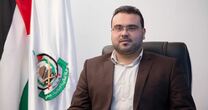
Spokesman for Hamas movement Hazem Qasem on Monday said that the Israeli government's decision to deduct funds from the tax revenues transferred to the Palestinian Authority (PA) is a robbery of the Palestinian people's money.
Qasem said in a press statement that the PA "soft policies" toward the Israeli occupation's practices have encouraged Netanyahu's government to commit more crimes.
"It is regrettable that the Israeli move was preceded by the PA decision to cut the salaries of the families of Palestinian martyrs and prisoners in the Gaza Strip," he added.
Qasem said that the PA should respond to these Israeli practices by ending the security coordination with the Israeli army and lifting the sanctions imposed on the Gaza Strip.
What is more important, he continued to say, is that the PA stops its monopoly of the decision-making and abide by the signed reconciliation agreements.
Qasem said in a press statement that the PA "soft policies" toward the Israeli occupation's practices have encouraged Netanyahu's government to commit more crimes.
"It is regrettable that the Israeli move was preceded by the PA decision to cut the salaries of the families of Palestinian martyrs and prisoners in the Gaza Strip," he added.
Qasem said that the PA should respond to these Israeli practices by ending the security coordination with the Israeli army and lifting the sanctions imposed on the Gaza Strip.
What is more important, he continued to say, is that the PA stops its monopoly of the decision-making and abide by the signed reconciliation agreements.

UNRWA on Sunday said that about 1.3 million Palestinians in the Gaza Strip are suffering from food insecurity.
UNRWA said in a monthly report for January 2019 that the Israeli blockade on the Gaza Strip led to high levels of unemployment and low purchasing power.
Over 68% of Gaza families are suffering from poverty and food insecurity, according to the report.
In another context, the United Nations Office for the Coordination of Humanitarian Affairs (OCHA) said that the large number of victims among Palestinian demonstrators in the Great March of Return did not pose any threat to Israel.
"This raises serious concerns over the excessive use of force by Israel and continues to cause enormous pressure on the health system in Gaza, including the health services provided by UNRWA," OCHA said.
OCHA pointed out that 20% of those injured in the Great March of Return are children, confirming the death of 13 students from UNRWA schools in the protests.
UNRWA said that the 12-year-long Israeli blockade is illegal under international law and is a form of collective punishment which threatens the continuation of life-saving services in the Gaza Strip.
The UN agency added that 39% of the patients applying for permits were unable to leave the Gaza Strip through Erez crossing to complete their treatment outside the enclave.
UNRWA said in a monthly report for January 2019 that the Israeli blockade on the Gaza Strip led to high levels of unemployment and low purchasing power.
Over 68% of Gaza families are suffering from poverty and food insecurity, according to the report.
In another context, the United Nations Office for the Coordination of Humanitarian Affairs (OCHA) said that the large number of victims among Palestinian demonstrators in the Great March of Return did not pose any threat to Israel.
"This raises serious concerns over the excessive use of force by Israel and continues to cause enormous pressure on the health system in Gaza, including the health services provided by UNRWA," OCHA said.
OCHA pointed out that 20% of those injured in the Great March of Return are children, confirming the death of 13 students from UNRWA schools in the protests.
UNRWA said that the 12-year-long Israeli blockade is illegal under international law and is a form of collective punishment which threatens the continuation of life-saving services in the Gaza Strip.
The UN agency added that 39% of the patients applying for permits were unable to leave the Gaza Strip through Erez crossing to complete their treatment outside the enclave.
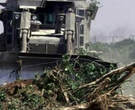
Israeli soldiers bulldozed, Monday, large areas of Palestinian lands in the northern West Bank governorates of Nablus and Qalqilia, in order to expand illegal colonies, built on private lands.
Ghassan Daghlas, a Palestinian Authority official who monitors Israel’s illegal colonialist activities in northern West Bank, said the soldiers invaded hundreds of Dunams of Palestinian lands, planted with almond trees, and bulldozed them.
Daghlas added that the army is bulldozing the lands to expand the illegal Givat Ronim colony, which was built on private Palestinian lands, east of Burin village southwest of Nablus.
In addition, the soldiers bulldozed large areas of Palestinian lands, owned by villages from Sanniriya and Masha villages, south of the northern West Bank city of Qalqilia.
Mohammad Sheikh, a member of Sanniriya village council, said the bulldozing of the Palestinian lands aims at linking four illegal colonies, which were built on private lands, in order to expand them by constructing more units and facilities.
He added that the illegal colonies Israel is trying to expand are Etz Efraim, Sha’arei Tikva, Elkana and Oranit.
Ghassan Daghlas, a Palestinian Authority official who monitors Israel’s illegal colonialist activities in northern West Bank, said the soldiers invaded hundreds of Dunams of Palestinian lands, planted with almond trees, and bulldozed them.
Daghlas added that the army is bulldozing the lands to expand the illegal Givat Ronim colony, which was built on private Palestinian lands, east of Burin village southwest of Nablus.
In addition, the soldiers bulldozed large areas of Palestinian lands, owned by villages from Sanniriya and Masha villages, south of the northern West Bank city of Qalqilia.
Mohammad Sheikh, a member of Sanniriya village council, said the bulldozing of the Palestinian lands aims at linking four illegal colonies, which were built on private lands, in order to expand them by constructing more units and facilities.
He added that the illegal colonies Israel is trying to expand are Etz Efraim, Sha’arei Tikva, Elkana and Oranit.
17 feb 2019
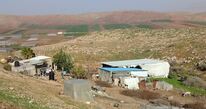
Israeli settlers escorted by full-armed soldiers on Sunday evening attacked Palestinian shepherds in the northern Jordan Valley.
Local activist Mootaz Besharat said a horde of Israeli settlers attacked Palestinian shepherds as they grazed their sheep in al-Farisiya area, in the northern Jordan Valley.
The settlers stole sheep from the area. Israeli soldiers showed up at the scene to provide the settlers with a tight security shield.
Palestinian citizen Ahmed Abu Muhsen was detained for hours before he was summoned to questioning at an Israeli detention center.
Local activist Mootaz Besharat said a horde of Israeli settlers attacked Palestinian shepherds as they grazed their sheep in al-Farisiya area, in the northern Jordan Valley.
The settlers stole sheep from the area. Israeli soldiers showed up at the scene to provide the settlers with a tight security shield.
Palestinian citizen Ahmed Abu Muhsen was detained for hours before he was summoned to questioning at an Israeli detention center.
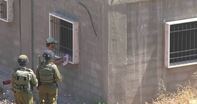
The Israeli occupation authorities on Sunday ordered the demolition of a tent used to provide tourist services to the visitors in al-Mas'udiyya archaeological area between Nablus and Jenin.
Mayor of Sebastia Mohammed Azem said in a press statement that the Israeli authorities handed Mohammed Salem a notice ordering him to remove his tourist tent completely and preventing him from working in the area.
Al-Mas'udiyya is a famous destination for internal Palestinian tourism, and it has the Hejazi railway station established during the Ottoman era to link Haifa, Jordan and Saudi Arabia.
Mayor of Sebastia Mohammed Azem said in a press statement that the Israeli authorities handed Mohammed Salem a notice ordering him to remove his tourist tent completely and preventing him from working in the area.
Al-Mas'udiyya is a famous destination for internal Palestinian tourism, and it has the Hejazi railway station established during the Ottoman era to link Haifa, Jordan and Saudi Arabia.
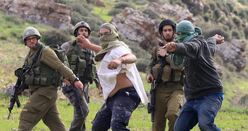
A group of Israeli settlers on Sunday detained and assaulted a Palestinian citizen in Silat ad-Dhahr town in Jenin.
Eyewitnesses said that masked Israeli settlers, with batons in their hands, attacked Palestinian vegetable vendors in the area and severely beat one of them.
Anti-settlement activist Ghassan Daghlas said that the Israeli settlers, by this attack, have crossed all red lines.
Eyewitnesses said that masked Israeli settlers, with batons in their hands, attacked Palestinian vegetable vendors in the area and severely beat one of them.
Anti-settlement activist Ghassan Daghlas said that the Israeli settlers, by this attack, have crossed all red lines.
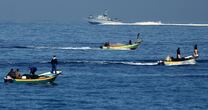
Israeli occupation navy on Sunday morning attacked Palestinian fishermen off the seashore of Khan Younis, south of the blockaded Gaza Strip, with barrages of machine gunfire.
According to local sources, Israeli gunboats opened fire at Palestinian fishing vessels setting sail within the authorized nautical miles.
No injuries have been reported in the Israeli shooting attack.
Israeli navy and troops routinely open fire on Palestinian fishermen sailing within the six-nautical-miles zone and on farmlands along the Gaza border, flagrantly violating the ceasefire deal that was reached in August 2014.
The current six-nautical-mile fishing zone falls drastically short of the twenty nautical miles allocated to Palestinian fishermen in the 1993 Oslo Accords.
According to the Palestinian Center for Human Rights (PCHR), all Israeli attacks on Palestinian fishermen have taken place within the distance of six nautical miles, which it said “proves that Israeli forces' policies aim to tighten restrictions on the Gaza Strip's fishermen and their livelihoods.”
According to local sources, Israeli gunboats opened fire at Palestinian fishing vessels setting sail within the authorized nautical miles.
No injuries have been reported in the Israeli shooting attack.
Israeli navy and troops routinely open fire on Palestinian fishermen sailing within the six-nautical-miles zone and on farmlands along the Gaza border, flagrantly violating the ceasefire deal that was reached in August 2014.
The current six-nautical-mile fishing zone falls drastically short of the twenty nautical miles allocated to Palestinian fishermen in the 1993 Oslo Accords.
According to the Palestinian Center for Human Rights (PCHR), all Israeli attacks on Palestinian fishermen have taken place within the distance of six nautical miles, which it said “proves that Israeli forces' policies aim to tighten restrictions on the Gaza Strip's fishermen and their livelihoods.”
16 feb 2019
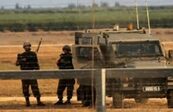
The Israeli army and navy opened fired, on Saturday morning, many live rounds at Palestinian agricultural lands and fishing boats, east of Gaza city and in northern Gaza.
Media sources said the soldiers, stationed across the perimeter fence, east of Gaza city, fired live rounds at Palestinian farmers on their own lands, east of Gaza city.
They added the attack did not lead to casualties, but forced the Palestinians to leave their lands, in fear of an additional military escalation.
In addition, Israeli navy ships fired live rounds at fishing boats, in Palestinian waters near Beit Lahia, in northern Gaza; damage was reported but no injuries.
Media sources said the soldiers, stationed across the perimeter fence, east of Gaza city, fired live rounds at Palestinian farmers on their own lands, east of Gaza city.
They added the attack did not lead to casualties, but forced the Palestinians to leave their lands, in fear of an additional military escalation.
In addition, Israeli navy ships fired live rounds at fishing boats, in Palestinian waters near Beit Lahia, in northern Gaza; damage was reported but no injuries.

The Palestine Children’s Relief Fund, on Thursday, held a press conference to announce the opening of the first and only Pediatric Cancer Department in the Gaza Strip, which is due to be officially opened on 19 February, according to the PNN.
The 24,000 square meter department, named Dr. Musa & Suhaila Nasir Gaza Pediatric Cancer Department, will provide daily health care with 15 beds, 16 rooms for overnight stays, 3 children’s examination rooms, a dental clinic, medical stations, a pharmacy and nursing stations.
The department will also provide a family gathering room and children’s play rooms with TVs, computers, books and toys. In addition, a full kitchen is equipped with a refrigerator, washing machine and dryer.
As part of its commitment to ensuring and sustaining services and support for children and their families, PCRF has served as a social worker and project manager in the new section in Gaza.
This is the second department to be opened in Palestine by PCRF, the first being the Huda Al-Masri section for child cancer patients at the Beit Jala Hospital in the West Bank, which was named after a founding member of the organization who died of cancer in 2009.
Huda Al-Masri was married to the Executive Director and co-founder of PCRF, who continued to lead the organization and oversaw the process of building this section to treat children in Palestine in honor of his wife’s human heritage.
According to a statement by PCRF, 100% of children with cancer in Gaza are referred for treatment in hospitals outside the Gaza Strip. In most cases, they can not travel with their loved ones because of the Israeli procedures for granting exit permits from the Gaza Strip. In addition to that the treatment of children is intermittent and may be delayed due to delays in granting permits or not re-issued for follow-up treatment, which leads to the cessation of treatment and affects the health of children.
PCRF was able to raise more than $3 million to build the department and to fully equip it with materials as well as high-quality design, with the help of hundreds of people around the world.
The PCRF is a US NGO with more than 26 years of experience in providing medical services and care for sick and wounded children in the Middle East, regardless of their political status and nationality. The department has been named d. Musa and Suhaila Nasser for children with cancer in Gaza in this name in honor of Dr. Musa and Sahila Nasser, who helped establish the Society in 1991 and in recognition of their humanitarian and leadership efforts.
It was established in 1991 in the United States of America to identify the needs of Arab children in the Middle East. For 26 years, the association has provided medical services and treatments that have saved the lives of thousands of children in the Middle East. In addition to direct medical services for children, the Society is making continuous efforts to find sustainable solutions to medical challenges by training local doctors and providing basic medical infrastructure for local hospitals.
The 24,000 square meter department, named Dr. Musa & Suhaila Nasir Gaza Pediatric Cancer Department, will provide daily health care with 15 beds, 16 rooms for overnight stays, 3 children’s examination rooms, a dental clinic, medical stations, a pharmacy and nursing stations.
The department will also provide a family gathering room and children’s play rooms with TVs, computers, books and toys. In addition, a full kitchen is equipped with a refrigerator, washing machine and dryer.
As part of its commitment to ensuring and sustaining services and support for children and their families, PCRF has served as a social worker and project manager in the new section in Gaza.
This is the second department to be opened in Palestine by PCRF, the first being the Huda Al-Masri section for child cancer patients at the Beit Jala Hospital in the West Bank, which was named after a founding member of the organization who died of cancer in 2009.
Huda Al-Masri was married to the Executive Director and co-founder of PCRF, who continued to lead the organization and oversaw the process of building this section to treat children in Palestine in honor of his wife’s human heritage.
According to a statement by PCRF, 100% of children with cancer in Gaza are referred for treatment in hospitals outside the Gaza Strip. In most cases, they can not travel with their loved ones because of the Israeli procedures for granting exit permits from the Gaza Strip. In addition to that the treatment of children is intermittent and may be delayed due to delays in granting permits or not re-issued for follow-up treatment, which leads to the cessation of treatment and affects the health of children.
PCRF was able to raise more than $3 million to build the department and to fully equip it with materials as well as high-quality design, with the help of hundreds of people around the world.
The PCRF is a US NGO with more than 26 years of experience in providing medical services and care for sick and wounded children in the Middle East, regardless of their political status and nationality. The department has been named d. Musa and Suhaila Nasser for children with cancer in Gaza in this name in honor of Dr. Musa and Sahila Nasser, who helped establish the Society in 1991 and in recognition of their humanitarian and leadership efforts.
It was established in 1991 in the United States of America to identify the needs of Arab children in the Middle East. For 26 years, the association has provided medical services and treatments that have saved the lives of thousands of children in the Middle East. In addition to direct medical services for children, the Society is making continuous efforts to find sustainable solutions to medical challenges by training local doctors and providing basic medical infrastructure for local hospitals.
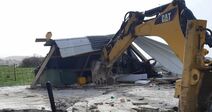
The Israeli authorities on Friday forced a Palestinian citizen in Umm al-Fahm in the 1948 occupied Palestinian territories to demolish his own agricultural facility.
According to Arab 48, Abdullah Jabarin was handed an order on Wednesday to demolish his store within 48 hours.
Otherwise, the Israeli authorities will carry out the demolition and force him to pay a heavy fine.
Jabarin said that he used the demolished facility, which was built over a year ago, as a storehouse for agricultural equipment.
Palestinians living in the territories occupied since 1948 are often forced to demolish their own homes and buildings under the pretext of lacking Israeli licenses. Those who do not abide by the orders are usually subjected to steep fines.
According to Arab 48, Abdullah Jabarin was handed an order on Wednesday to demolish his store within 48 hours.
Otherwise, the Israeli authorities will carry out the demolition and force him to pay a heavy fine.
Jabarin said that he used the demolished facility, which was built over a year ago, as a storehouse for agricultural equipment.
Palestinians living in the territories occupied since 1948 are often forced to demolish their own homes and buildings under the pretext of lacking Israeli licenses. Those who do not abide by the orders are usually subjected to steep fines.
15 feb 2019
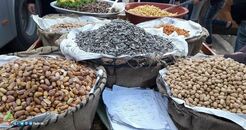
The Israeli Occupation Forces (IOF) assaulted on Thursday street sellers at the entrance to Fawar refugee camp, south of al-Khalil, and destroyed their goods.
According to eyewitnesses, an Israeli military bulldozer stormed the area and forcefully removed all street vendor stalls.
A number of street sellers were briefly detained and investigated during the attack, the sources added.
According to eyewitnesses, an Israeli military bulldozer stormed the area and forcefully removed all street vendor stalls.
A number of street sellers were briefly detained and investigated during the attack, the sources added.
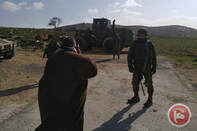
Israeli forces razed and leveled lands in the Urif village, in the northern occupied West Bank district of Nablus, on Friday morning.
Israeli forces also sealed a road with dirt mounds to prevent villagers from reaching their agricultural lands.
Ghassan Daghlas, an official who monitors settlement activity in the northern West Bank, told Ma’an that Israeli forces and settlers are attempting to “impose a reality” on Palestinian lands classified as Area B by razing and leveling large area of lands and preventing farmers from reaching their lands by placing dirt mounds to block the road.
Palestinian farmers own more than 200 dunams of agricultural lands in the eastern area of Urif.
Daghlas pointed out that the razing comes hours after Israeli settlers, from the nearby illegal Israeli settlement of Yitzhar, complained about the opening of an agricultural road for Palestinian farmers in Urif, which caused clashes to erupt between locals and Israeli forces and settlers.
Israeli forces also sealed a road with dirt mounds to prevent villagers from reaching their agricultural lands.
Ghassan Daghlas, an official who monitors settlement activity in the northern West Bank, told Ma’an that Israeli forces and settlers are attempting to “impose a reality” on Palestinian lands classified as Area B by razing and leveling large area of lands and preventing farmers from reaching their lands by placing dirt mounds to block the road.
Palestinian farmers own more than 200 dunams of agricultural lands in the eastern area of Urif.
Daghlas pointed out that the razing comes hours after Israeli settlers, from the nearby illegal Israeli settlement of Yitzhar, complained about the opening of an agricultural road for Palestinian farmers in Urif, which caused clashes to erupt between locals and Israeli forces and settlers.
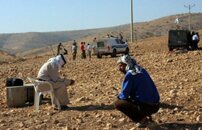
On Wednesday, Israeli forces cut off the water supply lines which provide water to the Masafer Yatta communities, south of Hebron.
The head of the Twaneh village council, Mohammed Reb’i, said that Israeli forces cut off water lines which feed 17 communities in Masafer Yatta.
Reb’i added that the measures come in the context of targeting citizens and their steadfastness in those areas, in an attempt to force them to leave their homes to illegal Israeli settlement expansion.
Israeli forces recently bulldozed a road that had been rehabilitated and connected the village of Twaned to the area of Khallet al-Daba.
According to the PNN, some 1,500 residents live in Masafer Yatta, and the Israeli occupation prevents the construction of roads and the provision of basic services, in these areas.
The head of the Twaneh village council, Mohammed Reb’i, said that Israeli forces cut off water lines which feed 17 communities in Masafer Yatta.
Reb’i added that the measures come in the context of targeting citizens and their steadfastness in those areas, in an attempt to force them to leave their homes to illegal Israeli settlement expansion.
Israeli forces recently bulldozed a road that had been rehabilitated and connected the village of Twaned to the area of Khallet al-Daba.
According to the PNN, some 1,500 residents live in Masafer Yatta, and the Israeli occupation prevents the construction of roads and the provision of basic services, in these areas.
14 feb 2019
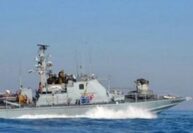
Israeli soldiers, and Israeli navy ships, opened fired on Thursday at dawn, at many Palestinian farmers, shepherds and fishermen, in several parts of the besieged and impoverished Gaza Strip.
Media sources in Gaza said Israeli navy ships fired dozens of live rounds at fishing boats, and at the coast in the Sudaniyya and the al-Waha areas, in central Gaza.
They added that the soldiers, stationed in military towers across the perimeter fence, also fired live rounds at Palestinian farmers, and shepherds, on Palestinian lands in Khan Younis, in the southern part of the Gaza Strip, and in Deir al-Balah, in central Gaza, in addition to areas east of Gaza city.
Media sources in Gaza said Israeli navy ships fired dozens of live rounds at fishing boats, and at the coast in the Sudaniyya and the al-Waha areas, in central Gaza.
They added that the soldiers, stationed in military towers across the perimeter fence, also fired live rounds at Palestinian farmers, and shepherds, on Palestinian lands in Khan Younis, in the southern part of the Gaza Strip, and in Deir al-Balah, in central Gaza, in addition to areas east of Gaza city.
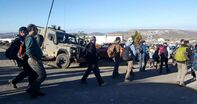
Extremist Israeli settlers attacked on Thursday homes of Palestinians in the village of Ourif, south of Nablus, in the northern occupied West Bank.
A horde of extremist settlers escorted by military patrols assaulted Palestinians’ homes in Ourif village, sparking clashes with the locals.
Sometime earlier, Israeli settlers attacked Palestinian farmers in Ourif’s southern corners while they were carrying out works to open a new agricultural road.
Settler violence against Palestinians and their property is routine in the West Bank and is rarely prosecuted by Israeli authorities.
According to the Israeli rights group B’Tselem, “As the occupying force, Israel must protect the Palestinians in the West Bank. However, the Israeli authorities neglect to fulfill this responsibility and do not do enough to prevent Israelis from attacking Palestinians, their property and their lands.”
A horde of extremist settlers escorted by military patrols assaulted Palestinians’ homes in Ourif village, sparking clashes with the locals.
Sometime earlier, Israeli settlers attacked Palestinian farmers in Ourif’s southern corners while they were carrying out works to open a new agricultural road.
Settler violence against Palestinians and their property is routine in the West Bank and is rarely prosecuted by Israeli authorities.
According to the Israeli rights group B’Tselem, “As the occupying force, Israel must protect the Palestinians in the West Bank. However, the Israeli authorities neglect to fulfill this responsibility and do not do enough to prevent Israelis from attacking Palestinians, their property and their lands.”
